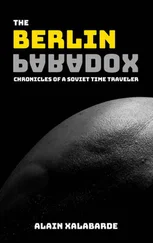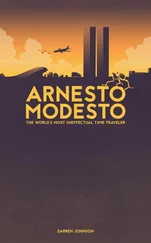James Gleick - Time Travel
Здесь есть возможность читать онлайн «James Gleick - Time Travel» — ознакомительный отрывок электронной книги совершенно бесплатно, а после прочтения отрывка купить полную версию. В некоторых случаях можно слушать аудио, скачать через торрент в формате fb2 и присутствует краткое содержание. Год выпуска: 2016, Издательство: Knopf Doubleday Publishing Group, Жанр: Старинная литература, на английском языке. Описание произведения, (предисловие) а так же отзывы посетителей доступны на портале библиотеки ЛибКат.
- Название:Time Travel
- Автор:
- Издательство:Knopf Doubleday Publishing Group
- Жанр:
- Год:2016
- ISBN:нет данных
- Рейтинг книги:5 / 5. Голосов: 1
-
Избранное:Добавить в избранное
- Отзывы:
-
Ваша оценка:
- 100
- 1
- 2
- 3
- 4
- 5
Time Travel: краткое содержание, описание и аннотация
Предлагаем к чтению аннотацию, описание, краткое содержание или предисловие (зависит от того, что написал сам автор книги «Time Travel»). Если вы не нашли необходимую информацию о книге — напишите в комментариях, мы постараемся отыскать её.
Time Travel — читать онлайн ознакомительный отрывок
Ниже представлен текст книги, разбитый по страницам. Система сохранения места последней прочитанной страницы, позволяет с удобством читать онлайн бесплатно книгу «Time Travel», без необходимости каждый раз заново искать на чём Вы остановились. Поставьте закладку, и сможете в любой момент перейти на страницу, на которой закончили чтение.
Интервал:
Закладка:
The Garden of Forking Paths is an enormous riddle, or parable, whose theme is time; this recondite cause prohibits its mention.
The story folds in upon itself: The Garden of Forking Paths is a book inside a book. (And now inside a pulp magazine.) The Garden is a meandering novel by “the oblique Ts’ui Pên.” It is a book that is also a maze. It is a set of chaotic manuscripts, “an indeterminate heap of contradictory drafts.” It is a labyrinth of symbols. It is a labyrinth of time. It is infinite—but how can a book, or a maze, be infinite? The book says, “I leave to the various futures (not to all) my garden of forking paths.”
The paths fork in time, not in space.
The Garden of Forking Paths is an incomplete, but not false, image of the universe as Ts’ui Pên conceived it. In contrast to Newton and Schopenhauer, your ancestor did not believe in a uniform, absolute time. He believed in an infinite series of times, in a growing, dizzying net of divergent, convergent and parallel times. This network of times which approached one another, forked, broke off, or were unaware of one another for centuries, embraces all possibilities of time.
In this, as in so many things, Borges seemed to be peering over the horizon. *8Later the literature of time travel expanded to encompass alternative histories, parallel universes, and branching time lines. A parallel adventure was under way in physics. Having drilled far down inside the atom, to a place where particles are inconceivably small and behave sometimes like particles and sometimes like waves, physicists encountered what appears to be an inescapable randomness at the heart of things. They were continuing the project of computing future states from specified initial conditions at time t = 0. Only now they were using wave functions. They were solving the Schrödinger equation. Calculations of wave functions via the Schrödinger equation produce not specific results but probability distributions. You may remember Schrödinger’s cat: either alive or dead, or neither alive nor dead, or, if one prefers (it’s something of a matter of taste), simultaneously alive and dead. Its fate is a probability distribution.
When Borges was forty years old and writing “The Garden of Forking Paths,” a boy named Hugh Everett III was growing up in Washington, D.C., where he read voraciously in science fiction— Astounding Science Fiction and other magazines. Fifteen years later he was at Princeton, a graduate student in physics, working with a new thesis advisor: that same John Archibald Wheeler, who must continually reappear, Zelig-like, in the history of time travel. Now it is 1955. Everett is uncomfortable with the idea that simply making a measurement must alter the destiny of a physical system. He makes note of a talk at Princeton in which Einstein says he “could not believe that a mouse could bring about drastic changes in the universe simply by looking at it.” *9He is also hearing all kinds of dissatisfaction with the various interpretations of quantum theory. Niels Bohr’s, he feels, is “overcautious.” It works, but it doesn’t answer the hard questions. “We do not believe that the primary purpose of theoretical physics is to construct ‘safe’ theories.”
So what if, he asks—encouraged by Wheeler, who is open as always to the weird and paradoxical—what if every measurement is actually a branching? If a quantum state can be either A or B, then neither possibility is privileged: now there are two copies of the universe, each with its own observers. The world really is a garden of forking paths. Rather than one universe, we have an ensemble of many universes. The cat is definitely alive, in one universe. In another, the cat is dead. “From the viewpoint of the theory,” he writes, “all elements of a superposition (all ‘branches’) are ‘actual,’ none any more ‘real’ than the rest.” Protective quotation marks run rampant. For Everett, the word real is thin ice atop a dark pond:
When one is using a theory, one naturally pretends that the constructs of the theory are “real” or “exist.” If the theory is highly successful (i.e. correctly predicts the sense perceptions of the user of the theory) then the confidence in the theory is built up and its constructs tend to be identified with “elements of the real physical world.” This is however a purely psychological matter.
Nonetheless, Everett had a theory, and the theory made a claim: everything that can happen does happen, in one universe or another. New universes are created on demand, as it were. When a radioactive particle may or may not decay, the Geiger counter may or may not register a click, the universe forks again. His dissertation itself followed a difficult path. It exists in several versions. One draft went to Copenhagen, where Bohr did not like it at all. Another, shortened and revised with help from Wheeler, became a paper that could be published in Reviews of Modern Physics —despite the obvious objections. “Some correspondents,” Everett wrote in a postscript, complained that “our experience testifies” that there is no branching, because we only have one reality. “The argument fails when it is shown that the theory itself predicts that our experience will be what it in fact is,” he said—namely, that in our own little universe we remain unaware of any branching. When Copernicus theorized that the earth moves, critics objected that we feel no such motion, and they were wrong for precisely the same reason.
Then again, a theory that posits an infinity of universes is an insult to Occam’s razor: Do not multiply entities needlessly.
Everett’s paper did not attract much notice at the time, and it was the last he ever published. He did not continue a career in physics. He died at the age of fifty-one, a chain-smoker and an alcoholic. But perhaps only in this universe. Anyway his theory outlives him. It has acquired a name, the many-worlds interpretation of quantum mechanics, an acronym, MWI, and a considerable following. In its extreme form, this interpretation obviates time altogether. “Time does not flow,” says the theorist David Deutsch. “Other times are just special cases of other universes.” Nowadays, when parallel worlds or infinite universes are pulled into service as metaphor, they come with semiofficial backing. When someone talks about alternate histories, it could be literature or it could be physics. The path not taken and the road not taken became common English expressions starting in the fifties and sixties—not earlier, despite Robert Frost’s most famous poem. Now any hypothetical scenario can be introduced with the familiar phrase, In a world where… It becomes harder to remember that this is only a figure of speech.
If we have only the one universe—if the universe is all there is—then time murders possibility. It erases the lives we might have had. Borges knew he was engaging in fantasy. Still, when Hugh Everett was a ten-year-old boy, Borges anticipated the many-worlds interpretation with eight precise words: “El tiempo se bifurca perpetuamente hacia innumerables futuros.”
Time forks perpetually toward innumerable futures.
*1 To the extent that Heraclitus’s actual words can be reconstructed and translated into English, another version is this: On those stepping into rivers staying the same other and other waters flow.
*2 Nabokov took the same jaundiced view a century later: “We regard Time as a kind of stream, having little to do with an actual mountain torrent showing white against a black cliff or a dull-colored great river in a windy valley, but running invariably through our chronographical landscapes. We are so used to that mythical spectacle, so keen upon liquefying every lap of life, that we end up by being unable to speak of Time without speaking of physical motion.”
Читать дальшеИнтервал:
Закладка:
Похожие книги на «Time Travel»
Представляем Вашему вниманию похожие книги на «Time Travel» списком для выбора. Мы отобрали схожую по названию и смыслу литературу в надежде предоставить читателям больше вариантов отыскать новые, интересные, ещё непрочитанные произведения.
Обсуждение, отзывы о книге «Time Travel» и просто собственные мнения читателей. Оставьте ваши комментарии, напишите, что Вы думаете о произведении, его смысле или главных героях. Укажите что конкретно понравилось, а что нет, и почему Вы так считаете.












